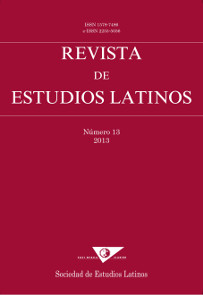Una nota implícita de latín vulgar en Isidoro de Sevilla: scabies quasi squamies (Etym. 4,8,10)
DOI:
https://doi.org/10.23808/rel.v13i0.87743Palabras clave:
Isidoro de Sevilla; latín vulgar; etimología.Resumen
Según Isidoro de Sevilla (Etym. 4, 8, 10), la patología denominada scabies es una descamación (squamatio) de la piel. A partir de este detalle real, explica el término scabies poniéndolo en relación con squamies, un nombre que parece inventado por el propio Isidoro. La etimología que este pasaje propone (scabies < squamies < squamatio) se basa en una confusión entre las consonantes b y m en el latín vulgar, es decir, en la posibilidad de pronunciar scamies (escrito squamies) en lugar de scabies. Squamies no es un término autónomo e independiente, sino solamente una pronunciación vulgar de scabies que Isidoro emplea para construir una etimología imposible de alcanzar por otras vías.Descargas
Los datos de descargas todavía no están disponibles.
Descargas
Publicado
13-12-2013
Cómo citar
Ferraces Rodríguez, A. (2013) «Una nota implícita de latín vulgar en Isidoro de Sevilla: scabies quasi squamies (Etym. 4,8,10)», Revista de Estudios Latinos, 13, pp. 101–109. doi: 10.23808/rel.v13i0.87743.
Número
Sección
Artículos
Licencia
Derechos de autor 2013 Revista de Estudios Latinos

Esta obra está bajo una licencia internacional Creative Commons Atribución-NoComercial-SinDerivadas 4.0.
Los originales publicados en las ediciones impresa y electrónica de esta revista son propiedad de las personas autoras de los mismos y se podrán difundir y transmitir siempre que se identifique la fuente original y la autoría en cualquier reproducción total o parcial de los mismos, y siempre que no tengan una finalidad comercial.






